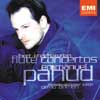Ibert; Khachaturian Flute Concertos
Some dazzling playing by a top-flight flautist makes this an ear-tickling disc
View record and artist detailsRecord and Artist Details
Composer or Director: Aram Il'yich Khachaturian, Jacques (François Antoine) Ibert
Label: EMI Classics
Magazine Review Date: 11/2003
Media Format: CD or Download
Media Runtime: 64
Mastering:
Stereo
DDD
Catalogue Number: 557563-2

Tracks:
| Composition | Artist Credit |
|---|---|
| Concerto for Flute and Orchestra |
Jacques (François Antoine) Ibert, Composer
David Zinman, Conductor Emmanuel Pahud, Flute Jacques (François Antoine) Ibert, Composer Zurich Tonhalle Orchestra |
| Pièce |
Jacques (François Antoine) Ibert, Composer
Emmanuel Pahud, Flute Jacques (François Antoine) Ibert, Composer |
Author: Edward Greenfield
When the majority of flute concertos are lightweight, it is not surprising that leading flautists are keen to expand the repertory, adapting more ambitious works. That is how, on the suggestion of the composer himself, Jean-Pierre Rampal in 1968 came to prepare a brilliant transcription of Khachaturian’s Violin Concerto recorded here by Emmanuel Pahud. A soft-grained flute could hardly cut through orchestral textures in the concert-hall in the way a violin can, but on disc careful balancing without focusing on the solo instrument too aggressively has produced a successful result.
The flute naturally lacks the required incisiveness for the first subject, but there are obvious gains in the lyrical second subject (2'05" into track 1): Pahud’s gentle tone and fine shading bring out echoes of Dvoák in New World vein, where the violin in the original has more of a gypsy flavour. Rampal and Pahud effectively replace the cadenza’s double-stops (at 7'48") with little arpeggiated flourishes, and surprisingly little seems changed.
Better still is the slow movement, where Pahud’s exquisitely hushed playing finds a mystery and tenderness in the hypnotic, Satie-like melody. In place of the finale’s brilliant extroversion on the violin, Pahud’s flute offers a cheeky lightness. James Galway in his RCA version brings out a jaunty penny-whistle quality, where Pahud relates this movement more clearly to the rest of the concerto.
Ibert’s unaccompanied Pièce makes an interlude between the concertos: a work which owes its easily improvisatory flow to Debussy’s Syrinx. The Flute Concerto was written for Marcel Moyse two years earlier in 1934; the finale’s mix of 6/8 and 3/4 metres brings a sharp, jazzy flavour.
What sets Pahud’s performance apart is the depth of feeling he conveys in the slow movement: poignantly mysterious, with breathtaking pianissimi matched by the strings of the Tonhalle Orchestra under David Zinman. The long, slow middle section in the finale, too, has a slinky quality, as in a valse grise. The recording, made in the Grosser Saal of the Tonhalle in October last year, is full and clear.
The flute naturally lacks the required incisiveness for the first subject, but there are obvious gains in the lyrical second subject (2'05" into track 1): Pahud’s gentle tone and fine shading bring out echoes of Dvo
Better still is the slow movement, where Pahud’s exquisitely hushed playing finds a mystery and tenderness in the hypnotic, Satie-like melody. In place of the finale’s brilliant extroversion on the violin, Pahud’s flute offers a cheeky lightness. James Galway in his RCA version brings out a jaunty penny-whistle quality, where Pahud relates this movement more clearly to the rest of the concerto.
Ibert’s unaccompanied Pièce makes an interlude between the concertos: a work which owes its easily improvisatory flow to Debussy’s Syrinx. The Flute Concerto was written for Marcel Moyse two years earlier in 1934; the finale’s mix of 6/8 and 3/4 metres brings a sharp, jazzy flavour.
What sets Pahud’s performance apart is the depth of feeling he conveys in the slow movement: poignantly mysterious, with breathtaking pianissimi matched by the strings of the Tonhalle Orchestra under David Zinman. The long, slow middle section in the finale, too, has a slinky quality, as in a valse grise. The recording, made in the Grosser Saal of the Tonhalle in October last year, is full and clear.
Discover the world's largest classical music catalogue with Presto Music.

Gramophone Digital Club
- Digital Edition
- Digital Archive
- Reviews Database
- Full website access
From £8.75 / month
Subscribe
Gramophone Full Club
- Print Edition
- Digital Edition
- Digital Archive
- Reviews Database
- Full website access
From £11.00 / month
Subscribe
If you are a library, university or other organisation that would be interested in an institutional subscription to Gramophone please click here for further information.




